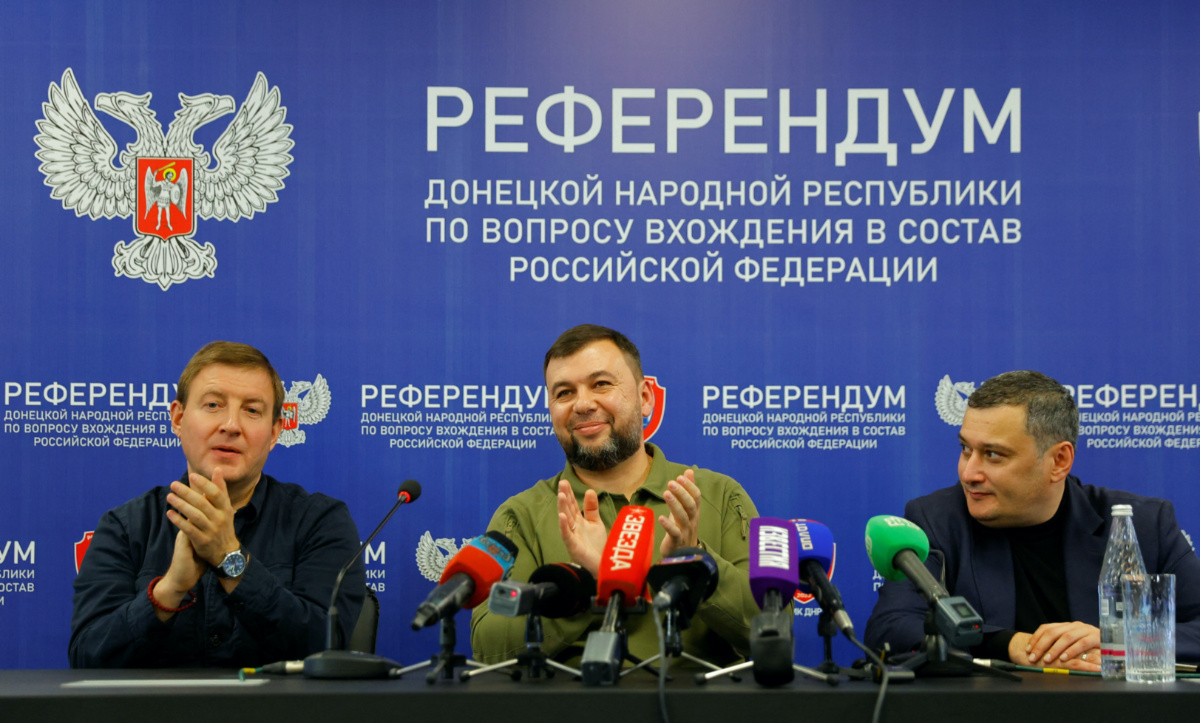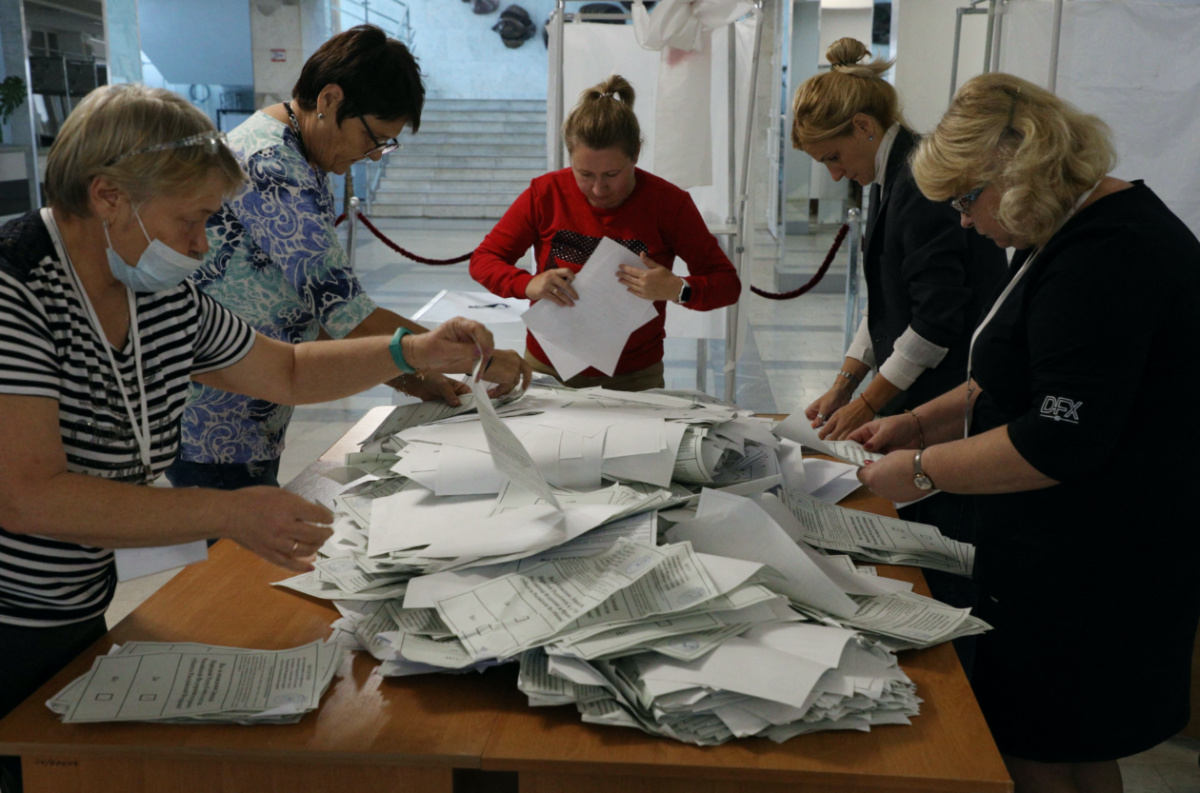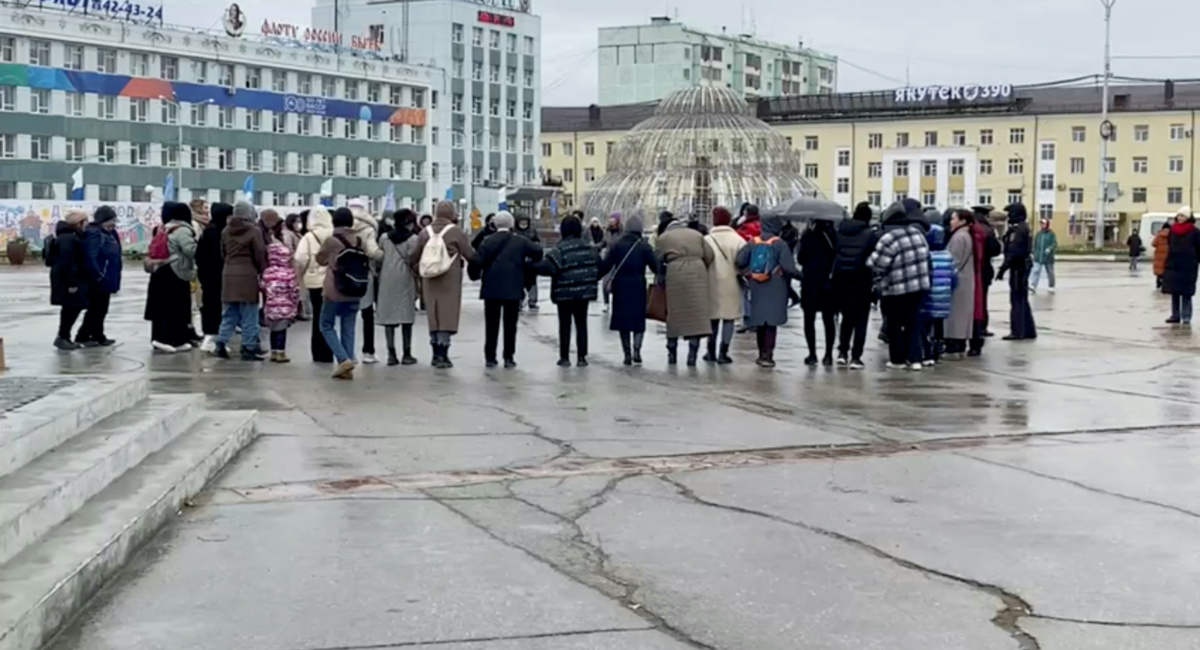London, UK/Zaporizhzhia, Ukraine
Reuters
An ally of President Vladimir Putin issued a stark new nuclear warning to Ukraine and the West on Tuesday as Russia began releasing results of referendums it bills as a prelude to it annexing four Ukrainian regions.
But an adviser to Ukrainian President Volodymyr Zelenskiy told Reuters Kyiv would not be swayed by nuclear threats or by the annexation votes, and would press on with plans to retake all territory occupied by invading Russian forces.

Head of the separatist self-proclaimed Donetsk People’s Republic Denis Pushilin, Chairman of the Committee of Russia’s State Duma on Information Policy, Information Technology and Communications Aleksandr Khinshtein and Secretary of the United Russia Party’s General Council Andrey Turchak attend a news conference on preliminary results of a referendum on the joining of the self-proclaimed Donetsk People’s Republic (DPR) to Russia, in Donetsk, Ukraine, on 27th September. PICTURE: Reuters/Alexander Ermochenko
Europe was investigating on Tuesday what Germany and Denmark said were attacks which had caused major leaks into the Baltic Sea from two Russian pipelines at the centre of an energy standoff with Moscow. But it remained far from clear who might be behind the leaks.
Tuesday’s nuclear warning by Dmitry Medvedev, deputy chairman of Russia’s Security Council, is one of several issued by Putin and his associates in recent weeks.
Diplomats say the nuclear sabre-rattling is an attempt by Moscow to scare the West into reducing its support for Kyiv by hinting at using a tactical nuclear weapon to defend the annexed territories of Ukraine.
For the first time Medvedev predicted that the NATO military alliance would not directly enter the Ukraine war even if Moscow struck Ukraine with nuclear weapons.
“I believe that NATO would not directly interfere in the conflict even in this scenario,” Medvedev said in a post on Telegram. “The demagogues across the ocean and in Europe are not going to die in a nuclear apocalypse.”
Zelenskiy’s adviser Mykhailo Podolyak brushed aside the comments, telling Reuters in an interview: “We will continue our work to de-occupy our territory regardless.
“We believe the war can only end when we have liberated our territory in the internationally recognised borders of 1991. We have no other scenarios,” he said.
Podolyak said the world’s nuclear powers should warn Russia that any use of strategic or tactical nuclear weapons in Ukraine would be met with concrete action.
“Sham referendums”
Russian-installed officials in the four occupied regions of Ukraine reported huge majorities on Tuesday in favour of becoming part of Russia after five days of voting in so-called referendums that Kyiv and the West denounced as a sham.
The head of the upper house of the Russian parliament said the chamber might consider the incorporation of the four regions into Russia on 4th October.
Ukraine urged the EU to impose new punitive sanctions in response to votes it said were often carried out at gunpoint.

Members of a local electoral commission count ballots at a polling station following a referendum on the joining of Russian-controlled regions of Ukraine to Russia, in Sevastopol, Crimea, on 27th September. Voting at the polling station was held for residents of the self-proclaimed Donetsk People’s Republic – the Russian-controlled region of Ukraine. PICTURE: Reuters/Alexey Pavlishak
The US ambassador to the United Nations, Linda Thomas-Greenfield, will introduce on Tuesday a resolution at the UN Security Council condemning the votes and urging member states not to recognise any altered status of Ukraine, a US official said.
Putin said on state TV the votes were designed to protect people from what he has called the persecution of ethnic Russians and Russian-speakers by Ukraine, something Kyiv denies.
“Saving people in all the territories where this referendum is being held is…the focus of attention of our entire society and country,” Putin said.
He earlier discussed with officials the mobilisation of farmers to fight in Ukraine, the latest step in a campaign he announced last week to support what Moscow calls its “special military operation” after this month’s battlefield reverses.
The mobilisation drive has sent thousands of Russians rushing to cross Russian borders into neighbouring countries.
Nearly 66,000 Russians entered the European Union, mostly via Finland and Estonia, between 19th and 25th September, a 30 per cent increase from the previous week, the bloc’s border agency Frontex said.
We rely on our readers to fund Sight's work - become a financial supporter today!
For more information, head to our Subscriber's page.
“Nothing more to fear”
Russian government officials have repeatedly warned they might use nuclear weapons if Kyiv’s forces, who control some of the areas Moscow claims, try to retake what Russia will soon regard as sovereign territory.
Washington has said it spelled out privately to Moscow what it described as “catastrophic consequences” for Russia if it resorted to nuclear weapons.
In central Kyiv, music teacher Andrii Liubomyr said he was unfazed by the possibility of a nuclear strike.
“So what? What do we have to fear after February 24? There is nothing more to fear,” he told Reuters, referring to the start of the Russian invasion.
Podolyak said Ukrainians who had helped Russia organise the annexation referendums would face treason charges and at least five years in jail. Ukrainians who were forced to vote would not be punished.
Ukrainian officials have reported ballot boxes being taken door-to-door and residents being coerced into voting in front of Russian troops.

Demonstrators carry out a traditional dance during a protest against Russia’s partial military mobilisation in Yakutsk, Russia, on 25th September in this still image obtained from a social media video. PICTURE: Sakhaday/via Reuters.
None of the provinces is fully under Moscow’s control and fighting has been underway along the entire front line, with Ukrainian forces reporting more advances since they routed Russian troops in a fifth province, Kharkiv, earlier this month.
Fighting raged in various parts of Ukraine on Tuesday.
Zelenskiy said the Donetsk region in the east remained his country’s – and Russia’s – top strategic priority, with “particularly severe” fighting engulfing several towns.
Pavlo Kyrylenko, the Regional Governor, said three civilians had been killed in the past 24 hours.
Ukrainian forces in the south continued trying to keep bridges and other river crossings out of action to disrupt supply lines to Russian forces. The air force said it had shot down three Iranian-made drones operated by Russia after an attack on the Mykolaiv region.
Reuters could not immediately verify battlefield reports.
Three explosions were heard, then electricity cut out late on Tuesday in Ukraine’s second city Kharkiv, a Reuters witness said.
– With reporting by Reuters bureaux






